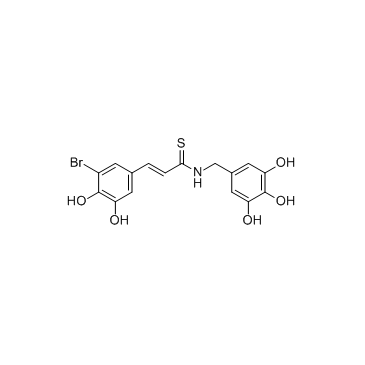NT157
Modify Date: 2025-09-21 17:17:44

NT157 structure
|
Common Name | NT157 | ||
|---|---|---|---|---|
| CAS Number | 1384426-12-3 | Molecular Weight | 412.255 | |
| Density | 1.8±0.1 g/cm3 | Boiling Point | 660.3±65.0 °C at 760 mmHg | |
| Molecular Formula | C16H14BrNO5S | Melting Point | N/A | |
| MSDS | N/A | Flash Point | 353.1±34.3 °C | |
Use of NT157NT157is a selective inhibitor of IRS-1/2, IC50 values at sub-micromolar doses (ranging from 0.3 to 0.8 μM) .IC50 value: 0.3 to 0.8 μM [1]Target: Insulin receptorin vitro: NT157 significantly affects the cells' migratory ability, as confirmed by a wound-healing assay. NT157 induces cytostatic effects, as evidenced by G2/M cell cycle arrest, and does not affect apoptosis. NT157, a novel small-molecule that specifically targets IRS protein, in OS cells. NT157 is a small-molecule inhibitor that induces Ser-phosphorylation and consequently the degradation of IRS-1 and IRS-2. NT157 efficiently affects migration ability of MG-63 and U-2OS OS cells. NT157 treatment induces cell cycle arrest and inhibits IGF system signaling. [1] The density of LNCaP cells grown in FBS was decreased approximately 20% at 1 μM, approximately 70% at 2 μM, and >90% at 5 μM (IC50, 1.4 μM). Growth of LNCaP cells is suppressed >60% when cultured in CSS but still exhibited significant density at 2 μM and maximal decreased density at 5 μM. The density of FBS-cultured PC3 cells was similarly decreased by NT157 treatment (40% at 2 μM and > 70% at 5 μM; IC50, 2.5 μM). [2]in vivo: NT157 suppresses growth of LNCaP xenografts following castration. NT157 treatment affects IGF1R and IRS targets in xenografts and significantly delays castration-resistant progression of LNCaP androgen-responsive xenografts when combined with castration. NT157 potentiates docetaxel activity in PC3 xenografts.[2] |
| Name | nt-157 |
|---|---|
| Synonym | More Synonyms |
| Description | NT157is a selective inhibitor of IRS-1/2, IC50 values at sub-micromolar doses (ranging from 0.3 to 0.8 μM) .IC50 value: 0.3 to 0.8 μM [1]Target: Insulin receptorin vitro: NT157 significantly affects the cells' migratory ability, as confirmed by a wound-healing assay. NT157 induces cytostatic effects, as evidenced by G2/M cell cycle arrest, and does not affect apoptosis. NT157, a novel small-molecule that specifically targets IRS protein, in OS cells. NT157 is a small-molecule inhibitor that induces Ser-phosphorylation and consequently the degradation of IRS-1 and IRS-2. NT157 efficiently affects migration ability of MG-63 and U-2OS OS cells. NT157 treatment induces cell cycle arrest and inhibits IGF system signaling. [1] The density of LNCaP cells grown in FBS was decreased approximately 20% at 1 μM, approximately 70% at 2 μM, and >90% at 5 μM (IC50, 1.4 μM). Growth of LNCaP cells is suppressed >60% when cultured in CSS but still exhibited significant density at 2 μM and maximal decreased density at 5 μM. The density of FBS-cultured PC3 cells was similarly decreased by NT157 treatment (40% at 2 μM and > 70% at 5 μM; IC50, 2.5 μM). [2]in vivo: NT157 suppresses growth of LNCaP xenografts following castration. NT157 treatment affects IGF1R and IRS targets in xenografts and significantly delays castration-resistant progression of LNCaP androgen-responsive xenografts when combined with castration. NT157 potentiates docetaxel activity in PC3 xenografts.[2] |
|---|---|
| Related Catalog | |
| References |
| Density | 1.8±0.1 g/cm3 |
|---|---|
| Boiling Point | 660.3±65.0 °C at 760 mmHg |
| Molecular Formula | C16H14BrNO5S |
| Molecular Weight | 412.255 |
| Flash Point | 353.1±34.3 °C |
| Exact Mass | 410.977600 |
| PSA | 145.27000 |
| LogP | 2.89 |
| Vapour Pressure | 0.0±2.1 mmHg at 25°C |
| Index of Refraction | 1.811 |
| InChIKey | NIPUPOUEGOSAAO-OWOJBTEDSA-N |
| SMILES | Oc1cc(CNC(=S)C=Cc2cc(O)c(O)c(Br)c2)cc(O)c1O |
| Storage condition | -20°C |
| 2-Propenethioamide, 3-(3-bromo-4,5-dihydroxyphenyl)-N-[(3,4,5-trihydroxyphenyl)methyl]-, (2E)- |
| (2E)-3-(3-Bromo-4,5-dihydroxyphenyl)-N-(3,4,5-trihydroxybenzyl)-2-propenethioamide |
| (E)-3-(3-bromo-4,5-dihydroxyphenyl)-N-(3,4,5-trihydroxybenzyl)prop-2-enethioamide |
| NT157 |